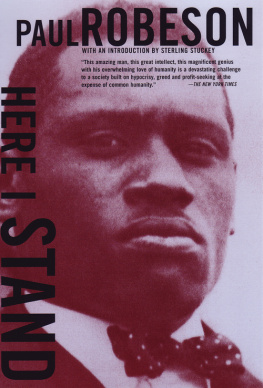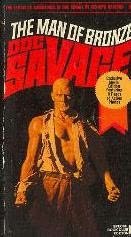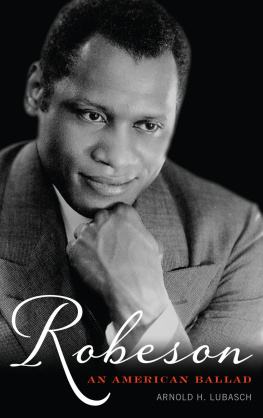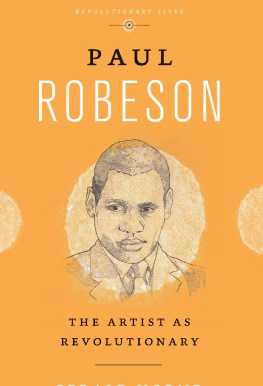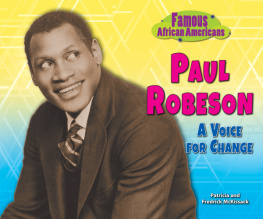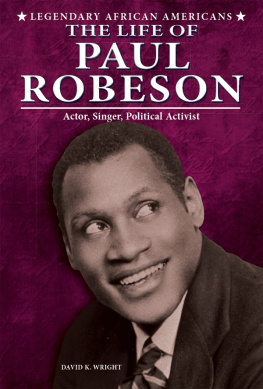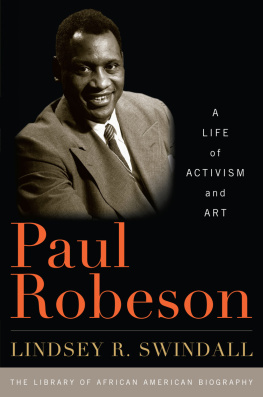Robeson - Here I Stand
Here you can read online Robeson - Here I Stand full text of the book (entire story) in english for free. Download pdf and epub, get meaning, cover and reviews about this ebook. year: 1958, publisher: Beacon Press, genre: Politics. Description of the work, (preface) as well as reviews are available. Best literature library LitArk.com created for fans of good reading and offers a wide selection of genres:
Romance novel
Science fiction
Adventure
Detective
Science
History
Home and family
Prose
Art
Politics
Computer
Non-fiction
Religion
Business
Children
Humor
Choose a favorite category and find really read worthwhile books. Enjoy immersion in the world of imagination, feel the emotions of the characters or learn something new for yourself, make an fascinating discovery.
Here I Stand: summary, description and annotation
We offer to read an annotation, description, summary or preface (depends on what the author of the book "Here I Stand" wrote himself). If you haven't found the necessary information about the book — write in the comments, we will try to find it.
Here I Stand — read online for free the complete book (whole text) full work
Below is the text of the book, divided by pages. System saving the place of the last page read, allows you to conveniently read the book "Here I Stand" online for free, without having to search again every time where you left off. Put a bookmark, and you can go to the page where you finished reading at any time.
Font size:
Interval:
Bookmark:



TO ESLANDA GOODE ROBESON
Distinguished writer and anthropologist
Thanks for many things
For your untiring labors in the interests of the African peoples,
For your devotion to the struggle of our folk here in America for full freedom,
For your constructive analyses of the momentous events at the United Nations, which affect all manner of human societies,
For the deeply shared belief in and labors for the attainment of a lasting peace for all the peoples of the earth,
And deepest gratitude for your help and guidance over many years of struggle, aspiration, achievement, and the constant awareness of a better future for our children and grandchildren.
Sterling Stuckey
The complex mix of forces that produced Paul Robesons character and outlook will become apparent long before the reader has completed Here I Stand. Indeed, the title of the books PrologueA Home in That Rockis from one of the great Negro spirituals and contains a world of meaning in itself:
I got a home in that rock, dont you see (2)
Between the earth an sky
Thought I heard my Savior cry
You got a home in that rock, dont you see
Poor man Lazarus, poor as I, dont you see (2)
Poor man Lazarus, poor as I
When he died he found a home on high
He had a home in that rock, dont you see
Rich man Dives, lived so well, dont you see (2)
Rich man Dives, lived so well
When he died he found a home in Hell
He had no home in that rock, dont you see
God gave Noah the rainbow sign, dont you see (2)
God gave Noah the rainbow sign
No more water but fire next time
Better get a home in that rock
A discussion of Robesons early life, A Home in That Rock goes far toward explaining why Robeson was later able to affirm, in remarkable measure, the revolutionary ethic at the heart of the song.
Robesons roots were established in a religion that reveals African influences through musical creativity that allows virtually no break between the sacred and the secular; indeed, the sacred music could be said to contain seeds of the blues and jazz that bloomed in the first decade of Robesons life. The role of the Negro home in that process deserves attention, especially when that home was, as was Paul Robesons, headed by a minister: Here in this little hemmed-in world where home must be theatre and concert hall and social center, there was a warmth of song. Songs of love and longing, songs of trials and triumphs, deep-flowing rivers and rollicking brooks, hymnsong and ragtime ballad, gospels and blues, and the healing comfort to be found in the illimitable sorrow of the spirituals. The poor people who sang those songs and entered the makeshift theater were mainly the children of southern migrants, some of whom, like Robesons father, were former slaves. Among Robesons friends and playmates at such gatherings was Emma Epps, who lived across from him on Green Street in Princeton. Now ninety, she recalled recently: Though we had trouble convincing him of it, Paul always had a voice. He could always sing.
Though he spent eight years in segregated elementary schools, in high school Robeson had positive experiences with whites, except for clashes with a racist principal who hated him for his qualities as an outstanding scholar and athlete. As a result, he regarded whites, on balance, as individuals, but he realized that most whites did not welcome competition from blacks: From an early age I had come to accept and follow a certain protective tactic of Negro life in America, and did not fully break with the pattern until many years later. Always show that you are grateful. (Even if what you have gained has been wrested from unwilling powers, be sure to be grateful lest they take it all away.) Above all, do nothing to give them cause to fear you.
Throughout his youth, Robesons father insisted on personal integrity, which included the idea of maximum human fulfillment. These values were related to an ethical system that favored what Robeson would come to see as socialist rather than capitalist values. Success was not to be measured in terms of money and personal advancement, but rather the goal must be the richest and highest development of ones own potential.
The selflessness inherent in Reverend Robesons outlookand the lack of greed that it promotedwas apparent in the generosity of one black to another that so impressed Robeson in his youth. Indeed, a form of socialism was acted out in that Princeton black community, and Robesons identification with the working class was no mere abstraction. His familyRobeson himselfwas an extension of that class. I had the closest of ties with these workers, he later wrote, since many of my fathers relativesUncle Ben and Uncle John and Cousin Carraway and Cousin Chance and othershad come to this town and found employment at such jobs domestics in the homes of the wealthy, serving as cooks, waiters and caretakers at the university, coachmen for the town and laborers at the nearby farms and brickyards. Not only were many of his relatives ex-slaves, but by the time Robeson was born ex-slaves and their children constituted almost the entire black population of America, a population not yet differentiated along class lines.
Not surprisingly, Robesons commencement address at Rutgers, which is not treated in Here I Stand, gave serious consideration to the liberation of the masses of blacks, and argued that his loyalty to them was sacred. At a family reunion in Philadelphia in 1918, he spoke on Loyalty to Convictions: That I chose this topic was not accidental, for that was the text of my fathers lifeloyalty to ones convictions. Unbending. Despite anything. From my youngest days I was imbued with that concept. This bedrock idea of integrity was taught by Reverend Robeson to his children not so much by preachment but, rather, by the daily example of his life and work.
The brutal experiences he underwent at Rutgers put his spiritual and physical resources to an extreme test. As a freshman at the age of seventeen, he went out for the football team and his teammates tried to kill him. Providing the symbolism for his ultimate relationship to America, they ganged up on him. They broke his nose, dislocated his shoulder, and cleated his hand, tearing away all the fingernails. He considered putting football behind him but remembered that his father had impressed upon him that when out on the football field or in a classroom or anywhere else I had to show that I could take whatever they handed out. This was part of our struggle.
Robeson continued to develop many of the talents that later brought him such acclaim years before he completed his undergraduate work at Rutgers, even though at no point in this process were things made easy for him. His successes in the classroom at Rutgers, and later at Columbia Law School, resulted from rigorous application of his intellect to the subjects at hand despite extraordinary demands on him from extracurricular activities ranging from athletics to acting and singing, at which he performed brilliantly. One of only two black students on the Rutgers campus during his entire four years, he was valedictorian of his class, a debating champion, and a tremendous football player, twice selected for the All-American team. Undoubtedly, his fathers insistence on maximum human fulfillment was a crucial factor in the flowering of Robesons genius. Yet the chemistry of mind and body that enabled him to achieve so much in so many fields remains one of natures mysteries.
Font size:
Interval:
Bookmark:
Similar books «Here I Stand»
Look at similar books to Here I Stand. We have selected literature similar in name and meaning in the hope of providing readers with more options to find new, interesting, not yet read works.
Discussion, reviews of the book Here I Stand and just readers' own opinions. Leave your comments, write what you think about the work, its meaning or the main characters. Specify what exactly you liked and what you didn't like, and why you think so.

